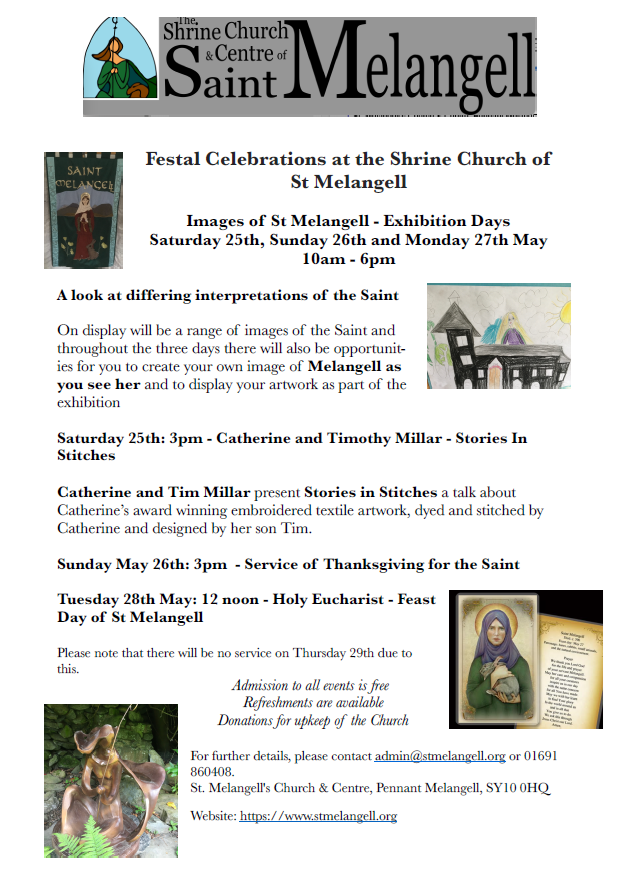‘And just as he was coming out of the water, he saw the heavens torn apart and the Spirit descending like a dove on him. And a voice came from heaven, “You are my Son, the Beloved; with you I am well pleased.” ‘ The baptism of Jesus, from Mark 1:9-12.
This image of the Trinity in the baptism of Jesus reminds us of the importance of family relationships for our own development and growth as Jesus is baptised by his second cousin, John the Baptist. The voice of God in heaven is heard, just as the God the Holy Spirit is depicted as a dove, that symbol of peace and hope. The God of relational love informs our relationships, too, just as relationships were key to St Melangell, whose feast day was celebrated here today with an exhibition of images of her.
What was Melangell like? Her appearance has been subject to a great deal of speculation and there are many images of her. One icon shows her arriving in the valley dressed in fine clothes, looking a rather frail figure with blond hair and blue eyes. Another depicts her more robustly with sturdy forearms developed through manual labour, the long, dark hair and eyes of a Celt and clad in a sensible brown woollen tunic. A further image shows Melangell hiding from the Prince, whilst wearing a velvet dress which highlights her figure and makes her look like a sexy Maid Marian.
One painting shows her in a cream dress with plaited ginger hair, whilst another depicts a rather severe haircut and dark clothing. A felted picture indicates two hares with her and there are many other images of her as a goddess, an earth mother and a feminist. One drawing denotes Melangell as part of creation in the form of a tree, the spirals of which are similar to those in a beautiful embroidered textile of the saint worked by Catherine Millar and designed by her son Timothy – some of these images will shortly be available to see on stmelangell.org
A lino cut of Saved, a Modern Melangell, depicts the saint wearing a necklace and cardigan as she comforts the frightened hare. Perhaps the most thought-provoking is a sculpture of Melangell by Fr Rory Geoghegan with her hair blowing in the wind and the hare hiding under her cloak. She carries her staff of office but has no facial features other than a vague outline – there are no defined eyes, lips or nose. In that sense, she is Everywoman, representing and challenging all of us – as she cared for the creatures round her, so could we; as she avoided conflict with Brochwel and they brought out the best in each other, that’s a challenge facing us, too; and as she and the sisters who joined her gave hospitality and care to the pilgrims coming here, so we can help to look after one another.
Melangell led a life of great contrast, being born into influence as the daughter of an Irish King or Chieftain, then spending at least a decade in prayerful solitude in the valley, before meeting Prince Brochwel, establishing the church here and finally living for thirty years or more in community with the other iwomen who came to join her here as word spread of what had happened. Hers was a life of great contrast and change, just as are those of so many in the changing circumstances of our day. Of course, there are those who say that she never existed and that she is simply a myth, but it doesn’t seem to me that a church would be dedicated and a shrine built for someone who never existed or that land where she and the sisters may have provided rest, food and care for those who needed it would still be called the sanctuary land to this day. The tradition of healing, sanctuary and hospitality that she and the unnamed women with her established is still very much evident here today and we celebrate it, with so much more, this Trinity Sunday as we honour those who have established and entrusted this place and tradition to our generation. Melangell, Brochwel and the community here answered God’s call, just as we in our day face the continuing challenge to do so in the circumstances in which we live. She is very much a saint for our times as well as hers and as we in relationship with God and each other consider Melangell’s example this Trinity Sunday, thanks be to God for this woman of faith, courage and relational character whose legacy still inspires so much today.
With my prayers; pob bendith,
Christine, Priest Guardian.


